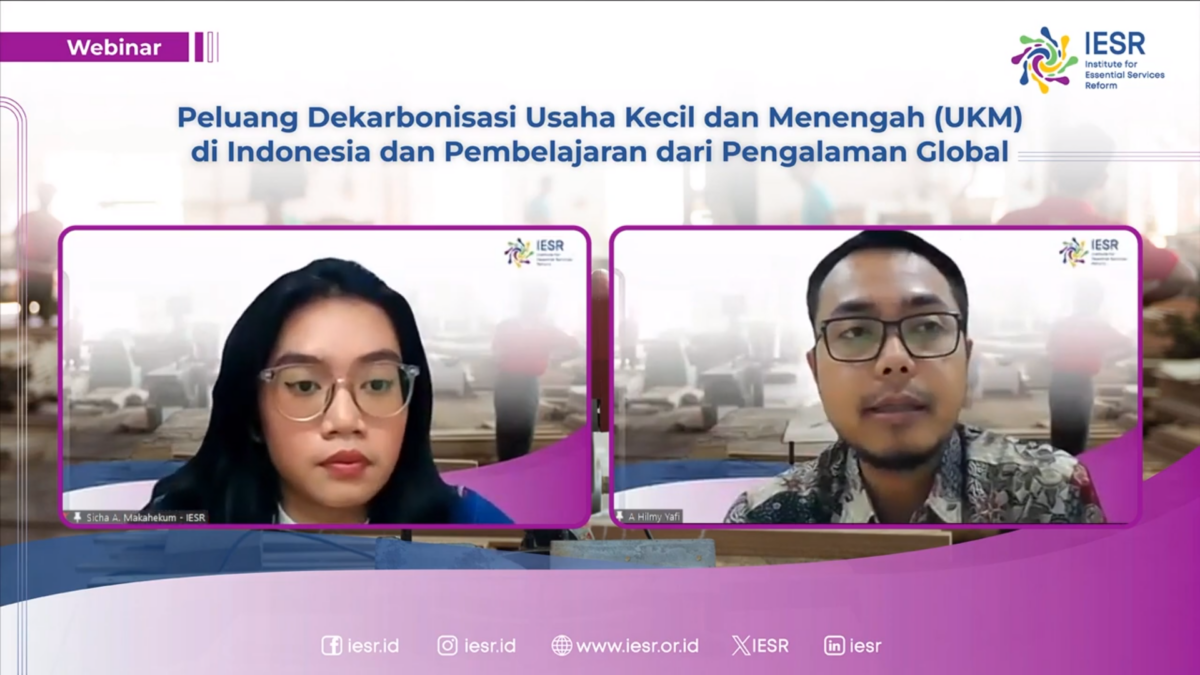Jakarta, 14 March 2024 – The industrial sector has become the backbone of the Indonesian economy. Not only large industries, Small and Medium Enterprises (SMEs) are also the driving force of the national economy, including creating employment opportunities and contributing 60.5% to GDP.
However, this economic contribution figure is also accompanied by large, haunting emissions. Fabby Tumiwa, Executive Director of the Institute for Essential Services Reform, in his opening remarks for the Webinar on Decarbonization Opportunities for Small and Medium Enterprises in Indonesia and Learning from Global Experience, said that currently emissions from the SME industrial sector in 2023 are 216 million tons of CO2e.
“This figure is equivalent to one third of national industrial sector emissions. So, we need to seriously strive to decarbonize the SMEs industry because by prioritizing the sustainability aspect, SMEs will level up,” said Fabby.
As much as 95% of the SME sector’s emissions come from burning fossil fuels, the remaining 5% from burning waste. Large economic contributions need to be anticipated as a result of emissions output. If significant steps are not taken to reduce SME sector emissions, there is a possibility that SME emissions will increase in the future.
Abyan Hilmy Yafi, IESR Energy Data Analyst, explained in a survey carried out by IESR on 1000 SMEs throughout Indonesia that to start decarbonizing the SME industry there are several approaches from increasing understanding to technical solutions such as switching technology.
“For cross-sectors, there is a need to increase the understanding of SMEs about energy consumption and the emissions they emit. Active outreach is also needed to promote renewable energy. By sectoral approach, there are several technical recommendations such as the use of electric boilers in the textile and apparel industry,” he explained.
Bo Shen, Energy Environmental Policy Research, LBNL explained that globally, challenges to decarbonizing the SME industry include gaps in the knowledge of SME owners or managers regarding emissions, energy, or furthermore climate change and its relevance to their business.
“When SMEs already have sufficient knowledge and awareness to carry out decarbonization or reduce emissions from their business, finance becomes the next obstacle. The current upfront costs for, for example, looking for technology vendors or energy service providers (Energy Service Company – ESCO), are still quite high for the financial scale of SMEs,” explained Bo Shen.
Each country will use a different approach to encourage the decarbonization of their SMEs. In the United States, for example, governments are collaborating with universities to build industrial assessment centers.
“Apart from being useful for decarbonizing the SMEs industry, this approach also prepares skilled workers who have direct training opportunities in the SME industry,” explained Bo Shen.
Bo also added an interesting case from China which formed an initiative called Green Growth Together (GGT). This initiative encourages decarbonization of SMEs that are part of established product supply chains.
The established brands they supply require their entire supply chain network to implement emission reduction or decarbonization practices. This demand also comes with required financial assistance or technical assistance.
Ahmad Taufik from the Green Industry Center of the Ministry of Industry (Kemenperin) stated that Indonesian is currently experiencing challenges in the industrial sector. The contribution of the industrial sector to GDP continues to decline.
“Structurally, we are still continuing to improve various things, from industrial development, SME development, to ensuring the availability of environmentally friendly jobs (green jobs) and professional staff (green professionals),” said Taufik.

